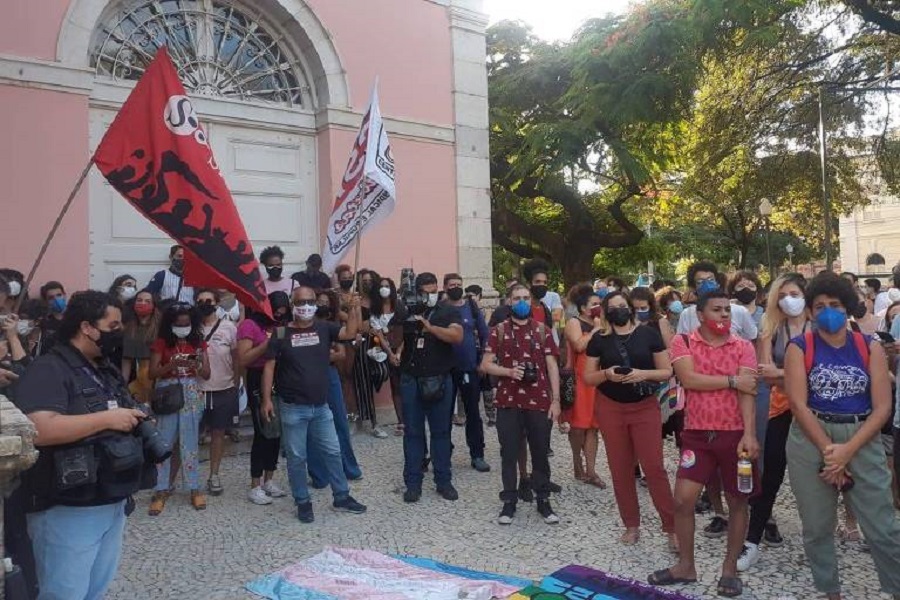RIO DE JANEIRO, BRAZIL – Transvestite Roberta Nascimento da Silva, 32, was homeless. Any canvas would
do as shelter. She was always seen in the surroundings of the Santa Rita pier, in downtown Recife, along with other homeless people.
In the early hours of Friday, June 25, she was the target of an attack that sparked protests in the capital of Pernambuco on Monday, June 28, when International LGBTQIA+ Pride Day is celebrated.

A 17-year-old boy poured alcohol on her body with the purpose of setting her on fire and killing her, according to the Civil Police. The flames quickly spread across the victim’s body, resulting in severe burns to her abdomen, chest, arms and one of her legs. The burns affected 40% of Roberta’s body. The teenager was arrested hours after the crime.
The victim was assisted by a SAMU (Mobile Emergency Care Service) rescue team and rushed to the Restauração Governador Paulo Guerra Hospital, a unit linked to the state health secretariat with a center for treating burn victims.
On the way to the unit, Roberta was asked her name and age. She struggled to say her registered name and that she was 40 years old. This information was used by the State Police and the SAMU team to register the patient, and Roberta, who should have been initially admitted to the female ward, ended up in the male ward.
She was only moved to a different ward and had her registration changed with her social name after activists intervened. “When I reached the hospital, she was in the men’s ward. We immediately talked to her and intervened,” said Robeyoncé Lima, PSOL co-deputy from Pernambuco.
Through its press office, the hospital said that upon learning that the patient was a transvestite, it immediately made the required changes and stressed that the delay in taking the patient to the women’s ward was due to a lack of official information and the condition in which Roberta was admitted to the unit.
The transvestite’s clinical condition only worsened. The day after her hospitalization, on Saturday, June 26, the medical team found a deep necrosis in her left arm caused by the burn. The limb was amputated to prevent the patient’s health from deteriorating further, according to the hospital’s press office.
Roberta was intubated after the surgical procedure because her lungs had excessive secretion and she was unable to breathe on her own.
On Monday morning, now conscious, she began to breathe without the aid of equipment, but her clinical condition remains critical.
In addition to sparking local protests, the violence against her moved transvestite activists and celebrities. Comedian and YouTuber Whindersson Nunes said on social media that he sent Roberta flowers and a note through a friend.
“I have a trans friend who spoke of Jesus to me in a very beautiful way when I had lost faith, and that love came back. […] Every time I think about her, I’m afraid that someone will do something like for no reason, because this is reality,” Nunes said.
Comedian Marcelo Adnet classified the case as “horrible” and said he was ready to help the victim.
The Civil Police investigations tracked down the 17-year-old boy because he had been seen in the same canvas tent where Roberta had been before the crime. As soon as he was arrested, the young man was assisted in a UPA (Emergency Care Unit) and, after being officially heard, “was charged for a similar offence to attempted murder,” the Pernambuco Civil Police said in a statement.
Following an evaluation by the Prosecutor’s Office, the youth was referred to the Initial Care Unit of the Department of Children and Youth, where adolescents involved in crimes are sent.
Folha de S.Paulo asked the Civil Police and the Prosecutor’s Office if the boy will also be held accountable for the crime of transphobia, but neither institution replied.
In reaction to Recife Mayor João Campos (PSB), who said on social media that he was monitoring Roberta’s case through his Secretariat of Social Development, the National Association of Transvestites and Transsexuals (ANTRA) said that “the state of Pernambuco is among the 10 most violent and with the highest figures of transgender people murdered in Brazil, with many cases in the capital.”
“We need specific policies to address this violence that remains neglected,” the association said.
Brazil is listed as the country killing the most transgender people among the major nations, according to international rankings.
In 2020, 175 murder cases among transgender people and transvestites were recorded in the country – a 41% increase over the year before. In the first 4 months of this year, another 56 violent deaths were recorded, according to ANTRA’s mapping.

